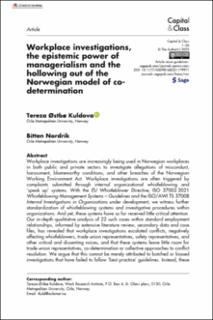| dc.contributor.author | Kuldova, Tereza Østbø | |
| dc.contributor.author | Nordrik, Bitten | |
| dc.date.accessioned | 2023-06-20T08:41:34Z | |
| dc.date.available | 2023-06-20T08:41:34Z | |
| dc.date.created | 2023-06-13T11:49:12Z | |
| dc.date.issued | 2023 | |
| dc.identifier.citation | Capital and Class. 2023, 1-26. | en_US |
| dc.identifier.issn | 0309-8168 | |
| dc.identifier.issn | 2041-0980 | |
| dc.identifier.uri | https://hdl.handle.net/11250/3072224 | |
| dc.description.abstract | Workplace investigations are increasingly being used in Norwegian workplaces in both public and private sectors to investigate allegations of misconduct, harassment, blameworthy conditions, and other breaches of the Norwegian Working Environment Act. Workplace investigations are often triggered by complaints submitted through internal organizational whistleblowing and ‘speak up’ systems. With the EU Whistleblower Directive, ISO 37002:2021 Whistleblowing Management Systems – Guidelines and the ISO/AWI TS 37008 Internal Investigations in Organizations under development, we witness further standardization of whistleblowing systems and investigative procedures within organizations. And yet, these systems have so far received little critical attention. Our in-depth qualitative analysis of 22 such cases within standard employment relationships, informed by extensive literature review, secondary data and case files, has revealed that workplace investigations escalated conflicts, negatively affecting whistleblowers, trade union representatives, safety representatives, and other critical and dissenting voices, and that these systems leave little room for trade union representatives, co-determination or collective approaches to conflict resolution. We argue that this cannot be merely attributed to botched or biased investigations that have failed to follow ‘best practice’ guidelines. Instead, these are by default inquisitorial processes: the employer funds the investigation, creates the mandate and acts as prosecutor, police and judge in one. We analyse these methods and their epistemic power in light of the increasing privatization and pluralization of policing within the context of regulatory capitalism and the ‘criminalization’ of compliance, arguing that such methods are an expression of larger phenomena that lead to the progressive hollowing out of co-determination and workplace democracy and justice, in Norway and likely elsewhere. | en_US |
| dc.language.iso | eng | en_US |
| dc.publisher | SAGE Publications | en_US |
| dc.relation.ispartofseries | Capital and Class; | |
| dc.relation.uri | https://journals.sagepub.com/doi/10.1177/03098168231179971 | |
| dc.rights | Navngivelse 4.0 Internasjonal | * |
| dc.rights.uri | http://creativecommons.org/licenses/by/4.0/deed.no | * |
| dc.title | Workplace investigations, the epistemic power of managerialism and the hollowing out of the Norwegian model of co-determination | en_US |
| dc.type | Peer reviewed | en_US |
| dc.type | Journal article | en_US |
| dc.description.version | publishedVersion | en_US |
| cristin.ispublished | true | |
| cristin.fulltext | original | |
| cristin.qualitycode | 1 | |
| dc.identifier.doi | http://dx.doi.org/10.1177/03098168231179971 | |
| dc.identifier.cristin | 2154061 | |
| dc.source.journal | Capital and Class | en_US |
| dc.source.pagenumber | 1-26 | en_US |
| dc.relation.project | Norges forskningsråd: 314486 | en_US |
| dc.relation.project | Norges forskningsråd: 313004 | en_US |

